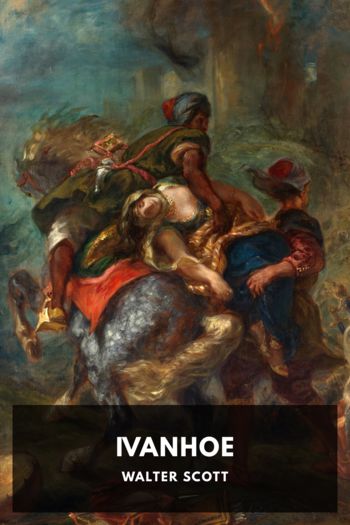Ivanhoe - Walter Scott (bookreader txt) 📗

- Author: Walter Scott
Book online «Ivanhoe - Walter Scott (bookreader txt) 📗». Author Walter Scott
“Cowardly dog!” said Prince John.—“Sirrah Locksley, do thou shoot; but, if thou hittest such a mark, I will say thou art the first man ever did so. However it be, thou shalt not crow over us with a mere show of superior skill.”
“I will do my best, as Hubert says,” answered Locksley; “no man can do more.”
So saying, he again bent his bow, but on the present occasion looked with attention to his weapon, and changed the string, which he thought was no longer truly round, having been a little frayed by the two former shots. He then took his aim with some deliberation, and the multitude awaited the event in breathless silence. The archer vindicated their opinion of his skill: his arrow split the willow rod against which it was aimed. A jubilee of acclamations followed; and even Prince John, in admiration of Locksley’s skill, lost for an instant his dislike to his person. “These twenty nobles,” he said, “which, with the bugle, thou hast fairly won, are thine own; we will make them fifty, if thou wilt take livery and service with us as a yeoman of our body guard, and be near to our person. For never did so strong a hand bend a bow, or so true an eye direct a shaft.”
“Pardon me, noble Prince,” said Locksley; “but I have vowed, that if ever I take service, it should be with your royal brother King Richard. These twenty nobles I leave to Hubert, who has this day drawn as brave a bow as his grandsire did at Hastings. Had his modesty not refused the trial, he would have hit the wand as well I.”
Hubert shook his head as he received with reluctance the bounty of the stranger, and Locksley, anxious to escape further observation, mixed with the crowd, and was seen no more.
The victorious archer would not perhaps have escaped John’s attention so easily, had not that Prince had other subjects of anxious and more important meditation pressing upon his mind at that instant. He called upon his chamberlain as he gave the signal for retiring from the lists, and commanded him instantly to gallop to Ashby, and seek out Isaac the Jew. “Tell the dog,” he said, “to send me, before sundown, two thousand crowns. He knows the security; but thou mayst show him this ring for a token. The rest of the money must be paid at York within six days. If he neglects, I will have the unbelieving villain’s head. Look that thou pass him not on the way; for the circumcised slave was displaying his stolen finery amongst us.”
So saying, the Prince resumed his horse, and returned to Ashby, the whole crowd breaking up and dispersing upon his retreat.
XIVIn rough magnificence array’d,
When ancient Chivalry display’d
The pomp of her heroic games,
And crested chiefs and tissued dames
Assembled, at the clarion’s call,
In some proud castle’s high arch’d hall.
Prince John held his high festival in the Castle of Ashby. This was not the same building of which the stately ruins still interest the traveller, and which was erected at a later period by the Lord Hastings, High Chamberlain of England, one of the first victims of the tyranny of Richard the Third, and yet better known as one of Shakespeare’s characters than by his historical fame. The castle and town of Ashby, at this time, belonged to Roger de Quincy, Earl of Winchester, who, during the period of our history, was absent in the Holy Land. Prince John, in the meanwhile, occupied his castle, and disposed of his domains without scruple; and seeking at present to dazzle men’s eyes by his hospitality and magnificence, had given orders for great preparations, in order to render the banquet as splendid as possible.
The purveyors of the Prince, who exercised on this and other occasions the full authority of royalty, had swept the country of all that could be collected which was esteemed fit for their master’s table. Guests also were invited in great numbers; and in the necessity in which he then found himself of courting popularity, Prince John had extended his invitation to a few distinguished Saxon and Danish families, as well as to the Norman nobility and gentry of the neighbourhood. However despised and degraded on ordinary occasions, the great numbers of the Anglo-Saxons must necessarily render them formidable in the civil commotions which seemed approaching, and it was an obvious point of policy to secure popularity with their leaders.
It was accordingly the Prince’s intention, which he for some time maintained, to treat these unwonted guests with a courtesy to which they had been little accustomed. But although no man with less scruple made his ordinary habits and feelings bend to his interest, it was the misfortune of this Prince, that his levity and petulance were perpetually breaking out, and undoing all that had been gained by his previous dissimulation.
Of this fickle temper he gave a memorable example in Ireland, when sent thither by his father, Henry the Second, with the purpose of buying golden opinions of the inhabitants of that new and important acquisition to the English crown. Upon this occasion the Irish chieftains contended which should first offer to the young Prince their loyal homage and the kiss of peace. But, instead of receiving their salutations with courtesy, John and his petulant attendants could not resist the temptation of pulling the long beards of the Irish chieftains; a conduct which, as





Comments (0)